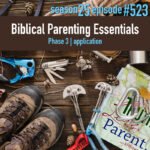[ad_1]
Choosing a curriculum can be tough! If you’re in any children’s ministry groups on social media, chances are you see this question often: What curriculum do you use? People want advice!
There are so many options out there, and weighing the pros and cons of buying a curriculum, using a free option, or even writing your own can be daunting. This article will give you tools that will help you evaluate curriculum, plus give you recommendations from other children’s ministry directors. (Find a free downloadable evaluation tool at the end of this article!)
Trust the Professionals When Choosing a Curriculum
A Not-So-Great Way to Fix a House
I bought a house recently. It’s a fixer-upper, and as my dad and I began demo work, we found a lot of patchwork solutions. First, there were sizable gaps in the siding that let rodents in, and there were traps to deal with the problem. There was shoddy electric work and melting wires caused by putting a three-prong adapter in an ungrounded plug. Extensive water damage was simply patched over, leading to mold and rotting wood that wouldn’t have held much longer.
I could go on…but you get the idea. It was clear the previous owners did the cheapest thing to solve the symptom of the problem, without actually considering the long-term impact.
A Not-So-Great Way to Choose a Curriculum
All this renovation work got me thinking about my previous job. I worked at a church where a large part of my job was writing curriculum for our kids. After all, we reasoned, we know our kids best. We know our ministry and what works for our logistics. No publisher can know that, right?
So we went the DIY route and saved some money in the process.
Then I got a job at Group Publishing. Over the years, I’ve learned so much about the intentionality that goes into every single activity—every sentence—in a lesson. I’ve learned how to help kids make discoveries, ask good questions, engage the senses, and create lightbulb moments where kids really understand what you’re teaching. Together, this intentional work helps to give kids a faith that sticks.
And perhaps most importantly, there’s a whole team of people working together, checking each other’s work—so if I have some sort of egregious theological inaccuracy, someone will catch it.
When I think back to my time writing curriculum for a church, with no one checking it and not really knowing what I was doing (despite my degree in Christian Formation and Ministry, with specific training in curriculum development), I realize that my work then was on par with the DIY, penny-pinching solutions my home’s previous owners used.
It worked okay for a time, but I wasn’t taking into account the intentionality needed to create lasting change. We used the cheapest option, but it wasn’t what was best for our kids.
A Lifelong Strategy
It may be true that a purchased curriculum might require some adaptation to work for the logistics of your ministry. But if I could go back in time, I would have partnered with publishers and trusted their expertise to write meaningful, intentional lessons, and then made my own tweaks here and there as needed.
In my house, I’m leaving the skilled work to professional roofers, plumbers, and electricians because I know that’s how to be sure the job gets done right. I also know that there’s a time for me to step in and do what only I can do best: Make the house my own. My paint, my fixtures, my décor—that’s where I’ll shine.
At Group, we want to partner with you to give kids innovative and purposeful experiences that help them go from knowing about God to knowing God. That way, you can focus on the work you’re the experts in: building relationships with kids and loving them. We just want to give you the right tools to do your job well.
But don’t just take our word for it! Hear from some in-the-trenches children’s ministry leaders who believe partnering with publishers is so important when choosing a curriculum.
7 Reasons to Partner With Publishers When Choosing a Curriculum
1. Because you shine when you focus on your kids and families.
“I have written my own curriculum in the past and learned very quickly that, even though my many years of teaching have given me the skills to write good curriculum, getting a published curriculum allows for me to do what I am called to do—children’s ministry! It allows me to love on kids and families, to meet their needs rather than spending time behind a computer.” –Julia Berger
“I think you have to ask yourself: Am I called to be a curriculum writer or am I called to minister where God has placed me? Writing curriculum well takes a lot of time!! So I need to be spending my time with my people and trust that God is empowering another group of people to fulfill their role in the kingdom.” –Mary Sims
2. Because you shine when you keep your church families on the same page.
“We are a two-campus church with two distinct make ups. A published curriculum helps us meet the goal of sharing the same Bible story each week at each place so our children and families are all learning the same thing and we can communicate easily with our families on what is happening in our ministry area.” –Rhonda Synovec
3. Because you shine when you make it easy for volunteers to use.
“It is important that we use a published curriculum because we have a wide variety of people volunteering within our children’s ministry department. The curriculum is simple and scripted, so that anyone is able to use it with ease.” –Loretta Cak
4. Because you shine when you focus on training and building relationships with volunteers.
“My job was to equip others to serve and in doing that I was making sure they were trained and had all the materials they needed to be successful in their classrooms or at events. Should I have spent some of the time used to build relationships and equip my team to be successful in writing? I think not. Teams of people who not only are trained in writing but who also test the material was certainly worth the expense and certainly a better use of my time.” –Eliese McAllister
5. Because you shine when you have a solid long-term plan.
“I also find that the scope and sequence of a curriculum helps me to get the students into more areas of the Bible, because left alone I repeat topics or miss areas of Scripture all together. The curricula keep me on track.” –Heidi Lewis
6. Because you shine when you use Bible-based materials.
“If I want to keep my awesome volunteers, I had better keep it easy and Bible-based. When I started at this church, they were using a curriculum that had been written by a member of the congregation. While the curriculum was detailed and rich, volunteers and the previous KidMin spent HOURS adding and taking away to fit for each age group each Sunday. The volunteers were exhausted and felt like too much was required of them.” –Randi Nussbaum
7. Because you shine when you only have to make tweaks.
“I feel using a solid purchased curriculum is a great stewardship of my time. To write a good, age-appropriate, interactive lesson that is engaging and helping the students connect with Jesus is hard and time-consuming work. To do it well and consistently for the course of the year means I would have to say ‘no’ to many other aspects of ministry to the students and their families. There are times I edit a lesson to fit a specific situation or needs of my learners, but starting with a pre-written lesson and doing a ‘tweak’ is much easier than starting from scratch.” –Heidi Lewis
Recommendations If You’re Choosing a Curriculum
So, which curriculums do these insightful children’s ministry directors actually use? Here are their recommendations based on what they’ve chosen—and why. Their recommendations may help you when choosing a curriculum, too!
Simply Loved
Rhonda Synovec says, “We use Simply Loved and absolutely love it. We chose this curriculum as it continues the VBS vibe the children love so much. It is flexible for classrooms, large group/small group settings and anything else in between. The volunteers love the ease and flexibility of leading this curriculum. They also love the continuity of the Bible Story, Bible Point, Bible Verse, and Bible Buddy to tie the morning together in a way that connects to children no matter their learning style. There is something here for everyone.”
DIG IN
Randi Nussbaum chose DIG IN with a review process that included her volunteers. Randi explains, “This group of volunteers ranging in ages between 25-70 unanimously chose to use DIG IN. They love to choose from their strengths what they’d like to teach and they have seen a change in how our kids are responding to the lessons taught. They SEE life change happening, deeper thinking stirring, and more to the Sunday than just the ‘milk.’”
Melody White loves DIG IN because “we love the fact that it’s all digital. It’s so easy for teachers to access, in the past you had to make sure substitutes physically get the hard copies of lessons. I love picking and choosing the components that fit my kids’ learning styles.”
BE BOLD
Mary Sims uses BE BOLD because “preteens have so many voices telling them that the Bible isn’t true and God isn’t real, and it is our chance to have conversations with kids at this critical time, to answer the tough questions that they have and to watch their faith flourish.”
FaithWeaver NOW
Julia Berger has used FaithWeaver NOW. She says, “FaithWeaver was chosen for a variety of reasons…. we love the scope and sequence! To have students work through the Old and New Testament over the course of 3 years is fantastic! [We] also love that it can be used for so many different age groups. The format of the weekly lessons and the provided material all at a very reasonable cost made FaithWeaver an easy choice!”
Group Resources
Loretta Cak uses a free curriculum, but also says, “We utilize Group resources a LOT because they do such a wonderful job of understanding child growth and development. Their programming is phenomenal—and can certainly be used with ease in a variety of denominations.”
Evaluation Tool for Choosing a Curriculum
So you’ve seen what can happen to a house—or a child—if things aren’t done right. You’ve heard from ministry leaders about why they partner with publishers and which curriculums they’ve chosen to use at their churches.
The next step in choosing a curriculum is to evaluate the options! This free evaluation tool will help you consider important aspects as you make your decision. It will help you assess how a curriculum aligns with your own ministry’s goals and objectives. It will also help you see how well it promotes spiritual growth, meets children’s needs, and how easy it is for your volunteers to use. Plus, there’s space to add your own “must haves.”
Click here to download this FREE evaluation tool.
And if you’re still looking for more advice, check out these articles! You can see what not to look for when choosing a curriculum and what red flags to steer clear of.
Want more leader resources? Check out these ideas!
© Group Publishing, Inc. All rights reserved. No unauthorized use or duplication permitted.
[ad_2]
Source link







You must be logged in to post a comment.